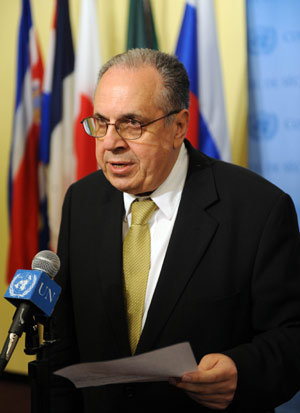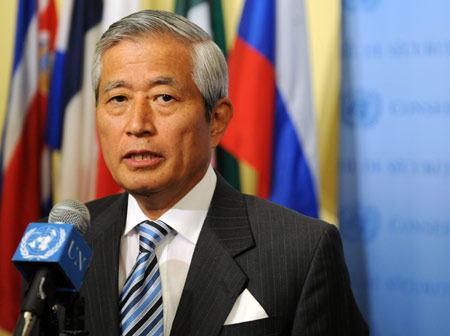The five permanent members -- China, France, Russia, the United Kingdom and the United States -- and Japan and the ROK also agreed to inspect cargo ships, with the consent of the ship's flag state, on the high seas suspected of carrying nuclear-related material to or from the DPRK.
 |
|
The president of the 15-nation Security Council for June, Turkish UN Ambassador Baki Ilkin, speaks to the media at the UN headquarters in New York, the United States, June 10, 2009. [Shen Hong/Xinhua]
|
If the flag state does not agree to an inspection on high seas, the vessel will be directed to a convenient port, where it will be inspected by local authorities who will dispose of prohibited items in "an appropriate manner," said Russian Ambassador to the UN Vitaly Churkin, who added that the technical process will be left up to individual countries' navies.
The draft resolution urges the DPRK to come back to the six-party talks without preconditions and expresses the Security Council's commitment to a peaceful, diplomatic and political solution to the situation.
It also requests that UN Secretary-general Ban Ki-moon create a panel of experts to monitor the sanctions' enforcement, and asks UN members to report on steps they're taking to implement the sanctions within 45 days.
Under the draft, the sanctions committee has 30 days to decide on further entities, goods and individuals to be subject to the travel ban and asset freeze imposed in Resolution 1718 after the 2006 nuclear test.
 |
|
Japanese UN Ambassador Yukio Takasu speaks to the media at the UN headquarters in New York, the United States, June 10, 2009. [Shen Hong/Xinhua]
|
Speaking to reporters, Japanese Ambassador to the UN Yukio Takasu said the additional sanctions will have "an extremely important impact", adding that he hoped they would "induce the DPRK to change their course of action and comply with our demands."
He added that Resolution "1718 contains many actions but ... they didn't send any effective signal. This time ... we tried to change this situation."
All 15 Council members met on the draft resolution at 11:00 a.m. EDT (1500 GMT) behind closed doors on Wednesday, with the earliest date for vote likely on Thursday.
On May 25, the Security Council voiced "the strong opposition to and the condemnation of" the DPRK nuclear test, the second of its kind since 2006, vowing to prepare a strong response to Pyongyang.
Following the DPRK's claims to have conducted a nuclear test in October 2006, the Security Council had demanded that the country "not conduct any further nuclear test or launch of a ballistic missile," and imposed sanctions against Pyongyang.
(Xinhua News Agency June 11, 2009)